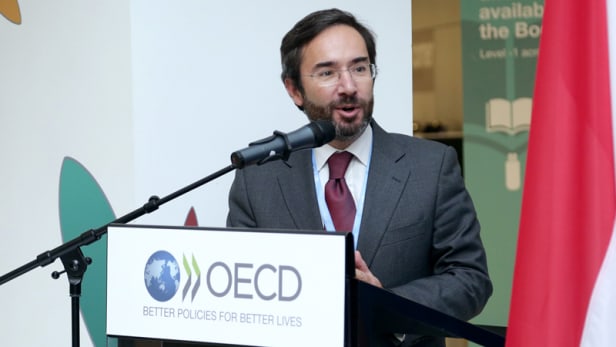By Jorge Moreira da Silva
 |
| Jorge Moreira da Silva, director of the OECD Development Co-operation Directorate. Photo by: OECD / CC BY-NC |
When I took up my position as OECD Development Co-operation director in November, I assumed it was clear we needed to bring business on board if we were serious about global development and sustainability. Yet I have been surprised by how many people still question whether we should involve the private sector in development.
The fact is that meeting the Sustainable Development Goals in developing countries will require $3.3-4.5 trillion in additional investment. Without increased private sector involvement — including the growth of healthy and sustainable businesses in low-income countries — we will never make it.
In my view, it is not a question of whether to involve the private sector. The private sector already provides, on average, 60 percent of gross domestic product, 80 percent of capital flows and 90 percent of jobs in developing countries. It is, rather, a question of how. How to make it happen, and how to make it work. In other words, how do we use development aid to diminish risk and attract investment where it is most needed? And how do we ensure that the goal of profit — the raison d’être of the private sector — is not at odds with the objectives of inclusiveness and sustainability?
The simple answer is that we need to make all investment good investment. This requires putting in place checks and balances to fight corruption where it does the most harm — among vulnerable and at-risk populations that depend on aid. We have some tools in hand, including new OECD guidelines for tackling corrupt practices in the provision of aid. These can help development agencies avoid doing business with private firms that engage in corruption — directly or inadvertently — when contracting services to implement their aid programs.
We also need to focus on the “supply side” of the bribery transaction, through legally binding standards that criminalize bribery of foreign public officials in international business transactions. Public and private companies should also observe wherever they operate. The fact that the standards apply to private and public entities alike helps level the playing field, ensuring we measure both against the same yardstick and pressure both to toe the line.
In all this, however, we need to remember that it is not enough to talk about the private sector. We need to engage with the private sector, listen to business leaders and understand what drives them; and we need to learn from their vast experience.
Finally, we need to enable private investment, directing it where it is needed most. Public money can be used to share the risks that keep investors away from areas where they are urgently needed, such as financial services, health care or infrastructure for poor communities. In this way, development cooperation can play a catalytic role, magnifying its potential to promote innovation and investment.
In his review of our Development Co-operation Report 2016: The Sustainable Development Goals as Business Opportunities, Jonathan Glennie recognizes that “There is indeed evidence that sometimes, maybe even often, the right thing is also the profitable thing. But often, cutting corners, ignoring standards, trampling on communities, polluting […] and working staff into the ground can be profitable too.” He argues that it is naive to think otherwise.
Certainly, we cannot sit back and expect business to always “do well by doing good.” Glennie goes on to say: “As business views and opportunities become ever more part of the sustainable development dialogue, the private sector should be approached with the appropriate amount of suspicion.”
I say, let’s use the checks and balances we have in hand. Let’s generate a political commitment to hold businesses accountable to internationally agreed standards, at home and in developing countries. Let’s promote a frank dialogue based on experience with what does — and doesn’t — work.
I believe we can provide incentives that will take investment where it is needed most. I believe we can do much more to generate shared benefits, for business and development. Used well, development aid can leverage the billions we have in hand to secure the trillions we need for a future free from poverty and inequality in a stable, sustainable world. There will be bumps along the road. But through partnership, we can make business good for sustainable development.

No comments:
Post a Comment